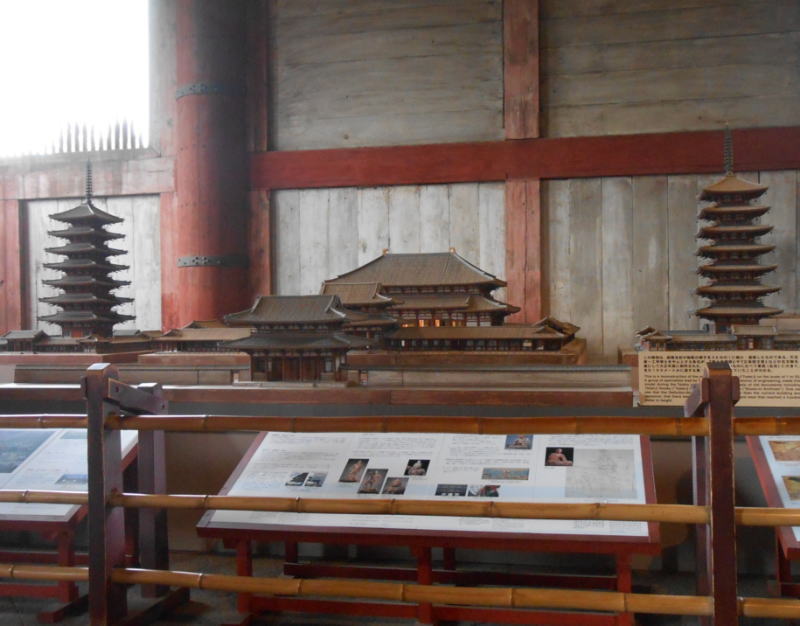
|

|
Last update October 13, 2022
東大寺
|
聖武天皇(701年~756年、在位724年~749年)

 神武天皇から数えると第45代目の天皇で、お父さんは文武(もんむ)天皇で、お母さんは藤原不比等の娘の宮子さん。お父さんの文武天皇が亡くなったときはまだ7歳。いくらなんでも、7歳の天皇ってのは頼りないじゃない?てなことで、おばあちゃんが元明天皇として中継ぎ。ばあちゃんって言ってもまだ若かったはずよ。だって、息子の文武天皇も25歳で亡くなったんだから。若いのねえー、今じゃアンタ、25歳なんていったら遊びざかりよー。でさ、聖武天皇は、14歳になったときに皇太子になったのね。皇太子って言えば、たくさんいる子供のなかでこの人が将来天皇になりますって約束された人なのよ。で、おばあちゃんの次は叔母さんが天皇になるのね。これが元正天皇よ。おばちゃんもまだ若いわよ、37歳。アタシなんか37歳のときはまだブイブイ言わしてたわよ。え?アタシの年はいくつかって?いや~ん、女性に年を聞くのはご法度よ~ん。
神武天皇から数えると第45代目の天皇で、お父さんは文武(もんむ)天皇で、お母さんは藤原不比等の娘の宮子さん。お父さんの文武天皇が亡くなったときはまだ7歳。いくらなんでも、7歳の天皇ってのは頼りないじゃない?てなことで、おばあちゃんが元明天皇として中継ぎ。ばあちゃんって言ってもまだ若かったはずよ。だって、息子の文武天皇も25歳で亡くなったんだから。若いのねえー、今じゃアンタ、25歳なんていったら遊びざかりよー。でさ、聖武天皇は、14歳になったときに皇太子になったのね。皇太子って言えば、たくさんいる子供のなかでこの人が将来天皇になりますって約束された人なのよ。で、おばあちゃんの次は叔母さんが天皇になるのね。これが元正天皇よ。おばちゃんもまだ若いわよ、37歳。アタシなんか37歳のときはまだブイブイ言わしてたわよ。え?アタシの年はいくつかって?いや~ん、女性に年を聞くのはご法度よ~ん。そして、聖武天皇が即位したのは24歳のとき、724年のことね。この頃はさあ、藤原氏とか、貴族の力がどんどん強くなっていたのね。藤原不比等の孫である聖武天皇が即位したのも、藤原氏の差し金ってとこね。実際、貴族の争いとか反乱とか、大変な時代だったらしくて、これがイヤだったのね、きっと。聖武天皇は仏教に深く帰依し、全国に国分寺・国分尼寺を作り、そして大仏さんを作ったの。でもさ、天皇さんなんだから自ら木を切り出したり、運んだりはしないわよね。結局、労働するのは農民とかの一般ピープル。ただでさえ、租・庸・調(そ・よう・ちょう)とかの税も納めなきゃなんないし、もう、たまんないわよ。そこらへん、やっぱり雲の上の人にはわからないのよねえ。これって、今も昔も変わらないわよね。ほんと、もうちょっと考えて欲しいわよね。
こうして、平和を願った聖武天皇だけど、墾田永年私財法(こんでんえいねんしざいほう)って言って、新しく開墾した土地は自分のものになるとかで、貴族の荘園が増えていき、すべての土地と人民は天皇の所有物という公地公民制度が崩れて、天皇の力は弱まって行ったわけ。
Emperor Shomu (701 - 756/Reign: 724 - 749)
 As the result of large-scale construction projects, the emperor had to see his authority declining. He was urged to approve humiliating laws to "Grant Hereditary Ownership of Lands for Three Generations" and to "Grant Permanent Hereditary Ownership of Cultivated Lands". Due to the enactment of these laws, the basic principle of "All People and All Lands Belong to the Emperor" was becoming obsolete. As the emperor was losing his power, the aristocrat began to increase their influence and ownership of lands.
As the result of large-scale construction projects, the emperor had to see his authority declining. He was urged to approve humiliating laws to "Grant Hereditary Ownership of Lands for Three Generations" and to "Grant Permanent Hereditary Ownership of Cultivated Lands". Due to the enactment of these laws, the basic principle of "All People and All Lands Belong to the Emperor" was becoming obsolete. As the emperor was losing his power, the aristocrat began to increase their influence and ownership of lands. 
